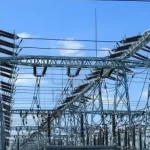THE Deputy Governor of Lagos State, Dr Obafemi Hamzat, yesterday, raised the alarm that just like New York City in the United States of America, USA, Lagos State is gradually sinking due to climate change.
Speaking yesterday at a Strategic Management Meeting with MDAs and Stakeholders organized by the Lagos State Ministry of Justice, Hamzat noted that the state faces imminent danger of submersion if proper steps are not taken to address the threats of climate change in the country.
Urging everyone to take action to prevent impending natural disasters, Hamzat cited examples such as the UK and New York City, where people are already relocating to safer areas due to climate change and warned that if action is not taken, Lagos could also face sinking and submersion.
He noted that with a shoreline of 180 kilometres, Lagos is surrounded by water.
“Today, Lagos and New York City are sinking,” he stated.
The Deputy Governor identified three existential threats to the state as extreme heat, climate change, and rising sea levels and emphasized that in the next 20 to 25 years, the state’s priorities must shift to identify which areas must be preserved.
In his opening remarks, the Attorney General and Commissioner for Justice, Mr Lawal Pedro SAN, explained that the purpose of the stakeholders’ meeting was to reduce government litigations in courts, preventing further clogging of the justice delivery system with avoidable cases.
Meanwhile, Ogun State government, yesterday, advised residents of flooded areas affected by the recent release of water from Oyan Dam to relocate to higher ground in line with its earlier warning.
Affected areas include Isheri, Riverview Estate, Oshorun Estate, OPIC Estate, Arepo, Mawere, Akute, Alagbole, Orimerunmu and Magboro.
The Commissioner for Environment, Mr Ola Oresanya, said this in response to the flood situation in the areas, which was as a result of the release of excess water by the Ogun-Osun River Basin Development Authority, ORBDA, from the Oyan Dam.
While noting that the release of excess water from the dam is unavoidable to avert damage that might lead to unpalatable consequences, Oresanya assured residents of the areas that the floodwater would start receding significantly from Friday, October 25, through waterways, watercourses, and canals dredged and provided for that purpose.











